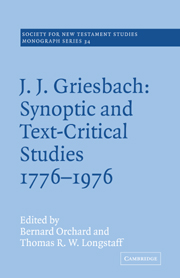Book contents
- Frontmatter
- Contents
- Portrait of J. J. Griesbach
- Copy of Colloquium announcement
- List of participants and selected observers
- Preface
- Abbreviations
- 1 The genesis of the Colloquium
- 2 Johann Jakob Griesbach: his life, work and times
- 3 The Gospel synopsis from 1776 to the present day
- 4 Griesbach's answer to the Synoptic Question
- 5 Commentatio qua Marci Evangelium totum e Matthaei et Lucae commentariis decerptum esse monstratur
- 6 A demonstration that Mark was written after Matthew and Luke
- 7 Griesbach and the development of text criticism
- 8 Modern text criticism and the Synoptic Problem
- 9 At the Colloquium's conclusion
- 10 The Griesbach Hypothesis: a bibliography
- Notes
- Appendix
- Index
2 - Johann Jakob Griesbach: his life, work and times
Published online by Cambridge University Press: 23 December 2009
- Frontmatter
- Contents
- Portrait of J. J. Griesbach
- Copy of Colloquium announcement
- List of participants and selected observers
- Preface
- Abbreviations
- 1 The genesis of the Colloquium
- 2 Johann Jakob Griesbach: his life, work and times
- 3 The Gospel synopsis from 1776 to the present day
- 4 Griesbach's answer to the Synoptic Question
- 5 Commentatio qua Marci Evangelium totum e Matthaei et Lucae commentariis decerptum esse monstratur
- 6 A demonstration that Mark was written after Matthew and Luke
- 7 Griesbach and the development of text criticism
- 8 Modern text criticism and the Synoptic Problem
- 9 At the Colloquium's conclusion
- 10 The Griesbach Hypothesis: a bibliography
- Notes
- Appendix
- Index
Summary
Recalling his own youth, Goethe says of the young Griesbach and the brothers Schlosser, that in Frankfurt ‘everyone cherished the sure hope that they would accomplish outstanding things in State and Church’. ‘Distinguished in those linguistic and other studies that open up the way to an academic career’, by their own excellence they stimulated others ‘to immediate emulation’. In this connection Goethe mentions that, ‘subsequently he formed a closer tie with these men, a tie that endured unbroken for many years’. In fact Goethe moved to Weimar in 1775, the same year in which Griesbach moved to Jena; as a result, there grew up a frequent interchange between the two men.
Growing up as he did in an intellectually lively Frankfurt bourgeois family, Johann Griesbach saw a wide horizon open out to him from his earliest days. Until 1806 Frankfurt was de facto a free imperial city; it had a great market, was a centre of international trade, a city of banks; it boasted also a busy book-fair, and was a city of both printing-presses and publishing houses. The Römer at Frankfurt was more than a wellknown market-hall; it was distinguished by the part it played in the coronation of the emperor, which was solemnized in Frankfurt from 1562 to 1792. Goethe has given us a detailed description of his impressions of the events surrounding the coronation of Joseph II as ‘King of the Romans’ in April 1764.
- Type
- Chapter
- Information
- Publisher: Cambridge University PressPrint publication year: 1979
- 2
- Cited by

